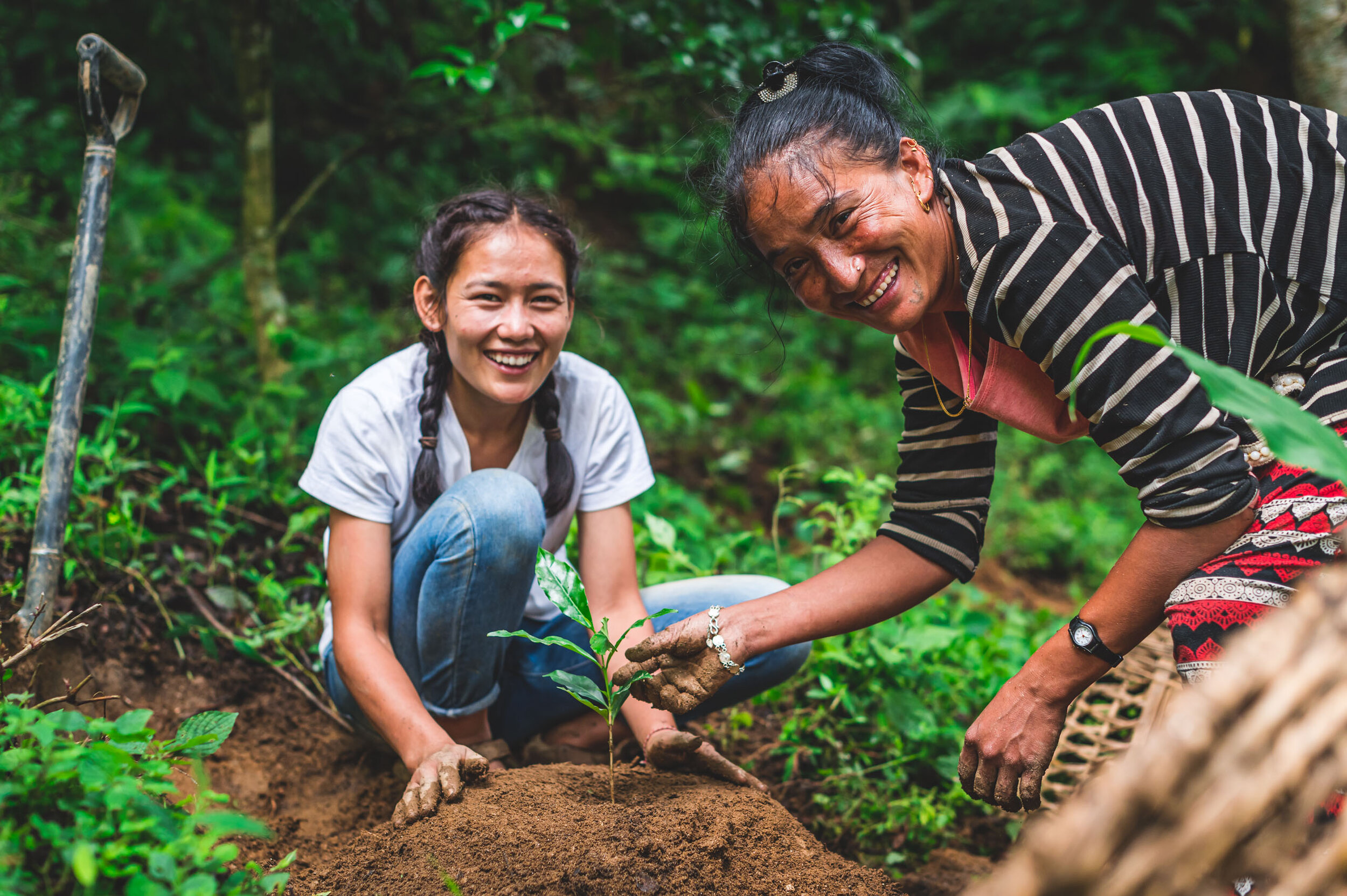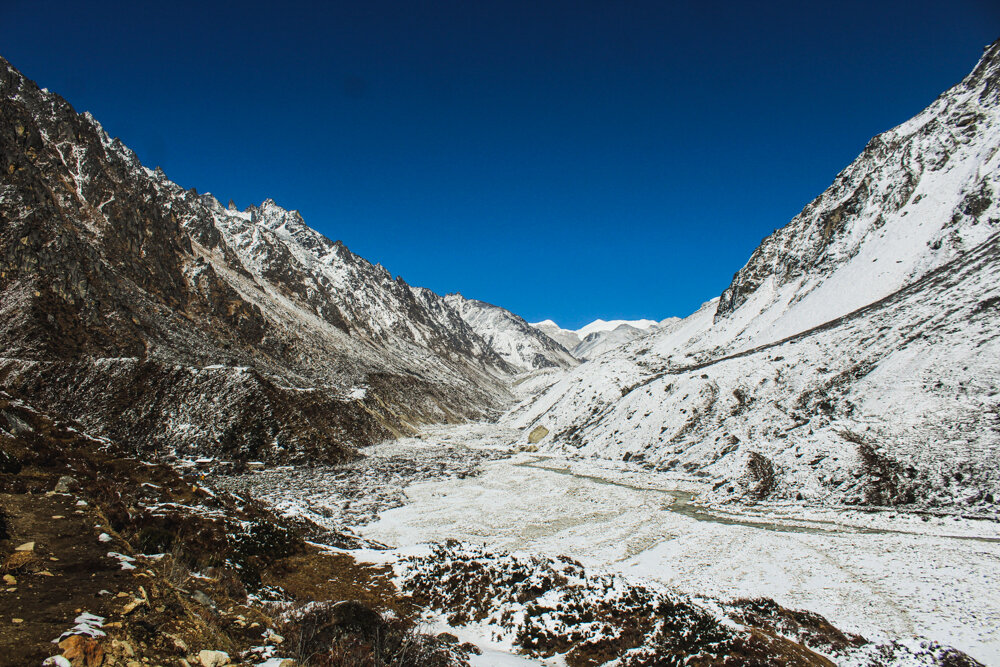It has been 365 days since Nepal closed its borders, airport and all nonessential travel to prevent the spread of COVID-19. Our last volunteer group left our project site on March 14th, 2020, leaving only 17 of us, our quarantine team (“quaranteam”). We didn’t know it then, but we would end up living together relatively isolated from the world in the mountains for more than 3 months. Our team stayed safe, and took every precaution in solidarity with the local community of Takure. In June 2020, repatriation flights allowed for our international volunteers to return to their homes around the world, leaving our local staff to lead Conscious Impact’s work through COVID-19. While Conscious Impact looked different in 2020, our work continued on, and now, 365 days later, we can say with confidence that Conscious Impact remains more committed than ever to Takure, and the surrounding communities of Indrawati Rural Municipality in Sindhupalchok, Nepal.
The “Quaranteam” of 17 amazing international volunteers, alongside local community leaders in June 2020. We spent nearly 3 months in total lockdown together, until repatriation flights allowed most team members to return home.
HOW WOULD THE WORLD AROUND US CHANGE?
The COVID-19 pandemic left Conscious Impact, and everyone around the globe, with endless questions about what the future would bring. Where would we be one year from now? How will our lives all change? And now, exactly one year later, we can finally reflect on who we are, and how we have changed.
In Nepal, the complete lockdown continued until September 2020, about 6 months in total. Airports then slowly reopened to Nepali citizens returning home, and limited days for public transportation were initiated. Many amazing leaders within Nepal guided efforts to help prepare Nepal, and especially mountain communities, for COVID-19 prevention once borders reopened. By December 2020, tourists were allowed to visit Nepal again, with the requirement of a visa before arrival and a negative PCR test result before boarding the plane.
As of March 2021, Nepal has reached 3012 total recorded deaths due to COVID-19 and more than 275,000 reported cases. For many of us, especially those from countries still in an active fight to keep COVID-19 deaths below 1 million, these statistics feel a bit relieving. The situation could have been far worse given the limited availability of necessary equipment like ventilators and few medical facilities in most rural areas. The year has not been without struggle including a humanitarian crisis for migrant workers trying to return home to Nepal from India in April and May 2020, plus crowded ICUs and lack of available beds in government hospitals around the festivals in October and November 2020. Nevertheless, we are grateful to the leaders that supported the prevention of COVID-19, the organizations and agencies working to alleviate the economic effects, and the communities within Nepal that kept one another safe by wearing masks and staying home.
The Conscious Impact team that stayed through it all, and remains in Takure today! Here, Program Director Beth Huggins poses with the big family of Conscious Impact Nepal on a staff day hike to Kattike Farm & Homestay. It was a full day of walking, playing games, and visiting a demonstration organic fruit farm full of apple trees and kiwis.
HOW will CONSCIOUS IMPACT’S WORK CHANGE?
This was the main question of our team for most of the past year. Given that normally our programs operate from funding and support of around 200 visiting volunteers each year, we were not sure how exactly our work would continue throughout COVID-19. Furthermore, with school closures and limitations on gatherings, much of our community-based work was halted. Many times we asked ourselves what to do, how to respond, and where to put our energy and focus. With limited financial resources, no new volunteers and shifting local priorities, decisions needed to be made. Our local team, with support from Program Director Beth Huggins and Agriculture Program Lead Greg Robinson, Conscious Impact took on a new, much more local, and still inspiring and impactful look.
The summer months from May-August 2020 were a very busy time for farmers in rural Nepal, and for our agriculture team. This is the time to plant corn, rice and millet in order to provide food for their families all year long. For farmers that partner with Conscious Impact, it is also tree planting time! COVID-19 only made us more aware of how changing global circumstances, including climate change, market uncertainty and pandemics, can affect vulnerable farming communities like Takure. So we continued to work with farmers, planting trees outside in the open air. In summer 2020, we worked with 82 different local farming families to plant more than 5400 coffee trees, plus an additional 1000 other fruit, nut and forest trees with another 76 farmers, making it our most successful, and hopefully someday most “fruitful,” tree planting season ever!
Following the summer, despite severe financial challenges, we felt it was essential to continue working towards our program goals in solidarity with Takure. Our organization is local. We live and experience the daily life, joys and challenges that come to the communities in the mid-hills of rural Sindhupalchok, Nepal. Our local and international team felt that this was an important time for our work, that in the midst of a global crisis, we needed to continue working to be of service and build sustainability and resiliency for future generations. Even when the schools were closed, our Youth team worked to meet with school administration, local community leaders, teachers and students to find ways to support the education system, suffering from lack of technology in rural areas. We continued to provide jobs to our staff, operating as much as our funding would allow. We wanted to use this challenging time to strengthening our programs, our staff team, our volunteer camp, and ultimately our organization.
In short, Conscious Impact survived. In fact, not only did we survive, on many days we thrived. We built new partnerships, we developed new elements of our programs, we hired a new Community Organizer, and we even made some bricks! This is only the case because of the generous monthly donors we have from around the world.
Without our monthly donors, Conscious Impact would NOT have been able to continue our work, or survive through the COVID-19 pandemic. We owe our organization to YOU.
Conscious Impact Nepal Agriculture Program Coordinator, Kumari Bomjan and community leader and government representative, Shobhana Tamang planting coffee trees together in July 2021. Photo credit: Jonathan H. Lee
What will the future bring in nepal?
We asked our friend and one of Conscious Impact Nepal’s Board Members to comment on the situation with COVID-19 in Nepal. Raj Gyawali is a leader and innovator in sustainable tourism and lucky for us, an advisor to our work in Nepal. Raj is the founder and owner of Socialtours in Nepal, the first sustainability certified tour company in Asia.
“Since March 2020, tourism in the country of Nepal has come to a virtual standstill, and businesses are in the verge of collapsing, not to mention the thousands of jobs that have been lost. Nepal is however, endeavoring to open to the new world of travel, with particular focus on the pandemic and its ramifications. The country is currently open, albeit with conditions related to tests and quarantine. This is allowing the industry to start understanding how tourism could function with controls on the pandemic, both to the traveler and the community. While it might be complicated to come to Nepal at this particular time, there are always ways to connect. Several organizations are making meaningful utilization of the time, working with communities and helping them deal with the economic fallout caused by the pandemic, through agile pivots in the areas of agriculture, technology, innovation and micro enterprises, one of the main positive outcomes of the pandemic. Understanding what they do, engaging with them and supporting them can be a great way to connect from afar. When the time is right, one can always come in and also get engaged physically. Hopefully soon.” - Raj Gyawali
Today, life can sometimes be mistaken as normal, but the reality is far from that. The World Bank estimates that in the best-case scenario Nepal’s economy will not recover to pre-COVID levels until 2023. The economic loss, particularly with informal workers within Nepal, will have a far reaching impact. As for staying healthy, families are still precautious and many people wear masks, though not all. In Kathmandu, most places are business as usual. The largest exception is of course the lack of tourism, which faced a nearly 81% drop in 2020 reported by the Kathmandu Post, stating further:
“Nepal’s tourism sector generated Rs240.7 billion (2.07 billion USD) in revenue and supported more than 1 million jobs directly and indirectly in 2018, according to the annual World Travel and Tourism Council research report. The London-based organization said that travel and tourism's total contribution to the country’s gross domestic product stood at 7.9 percent.” (Kathmandu Post, https://tkpo.st/3oe6Kdq)
As the COVID-19 vaccine becomes available both in Nepal and countries around the world, we do wonder what will be the long lasting changes around us…
Flooded rice terraces in July 2020 | Photo Credit: Jonathan H. Lee of Subtledream Photography
WHEN WILL WE HAVE VOLUNTEERS AGAIN?
It has been a challenging, educational and exciting year! We weren’t able to reach all of our goals and certainly our work has been more difficult than ever with funding cuts, but we are still here dedicated to generational change. We miss the diversity, energy and enthusiasm of having volunteers and guests from all around the world, and we truly look forward to having international guests again. Our local Nepali team talks often about how fun and unique it is to have 30+ people around at lunch time or how much more fun volunteer music playlists make work. We miss having volunteers so much!
With Nepal open to tourists, we have begun to process individual applications for volunteering. Due to reduced resources and team members, we are only able to accept a very small amount of volunteers for different, specific programs and work throughout the spring and summer 2021. While it isn’t the normal community living volunteer experience, it is loads of fun, culturally immersive, and full of meaningful work. For more information, fill out our volunteer form on our website.
Thank you so much for your support, and for reading this story.
stay tuned for more volunteer programs in October 2021!
Kachenjunga National Park | Photo Credit: Joshua Umesh Bohara






